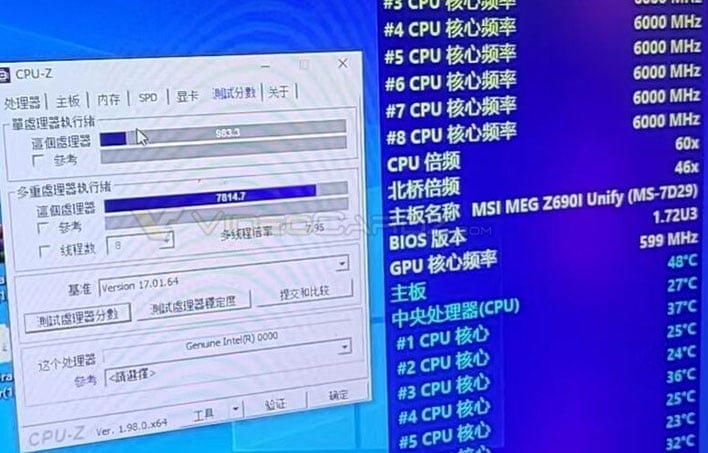Evidence of a number of CPU-Z benchmark runs using a system based upon an Intel Core i7-13700K engineering sample (ES) have turned up on-line. Images and videos recording a PC’s screen appear to show an overclocked
Raptor Lake, or 13th gen Intel Core processor, being pushed to 6GHz on all performance cores (P-cores). Moreover, the benchmark scores are very impressive.
The headlining clock speed of 6GHz was achieved on the purported Intel Core i7-13700K with efficiency cores (E-cores) disabled. This is a popular methodology used by
overclockers to get peak performance in some scenarios, as it seems to provide a little more headroom. A core voltage of 1.421V was set. The screenshot reports the CPU core temperatures between 25°C and 37°C, so this picture was likely snapped sometime after the benchmark run had completed.
Moving onto the scores, the CPU-Z single threaded (1t) test result was a fantastic 983 points. This is far higher than any Alder Lake chip at stock speeds. For example, the direct ancestor of this Raptor Lake CPU, the i7-12700K, scores just 790 in CPU-Z 1t tests. Even the mighty i9-129090KF only scores 819. Last but not least, a leak of a CPU-Z 1t score from an
Intel Core i9-13900K, running eight P-cores at 5.5GHz achieved 892 in the CPU-Z 1t tests.
Moving along to dissect the multithreaded (nT) test results shown in the screenshots, the best result was a score of 12,896 points. For this result, the overclocker had all 16 physical cores enabled. The eight P-cores ran at 5.8GHz, and the eight E-cores ran at 3.7GHz. 1.5V was used to drive the chip in this config, but again we only get to see post-benchmarking core temperatures.
For some perspective on this nT test result, it is better than any official CPU-Z score out there for any factory clocked 16-, 20-, 24-, or 32-core CPUs, according to the official
CPU-Z validator site.
The above results, courtesy of
Esperonslaie, are all the more impressive as the overclocker appears to have used Intel 600-series chipset motherboards, with BIOS files that aren’t yet optimized for Raptor Lake performance. Though information about Intel’s 14th gen Meteor Lake has stolen some excitement from the 13th gen release, indications are building that Raptor Lake will be more than just a filler.

